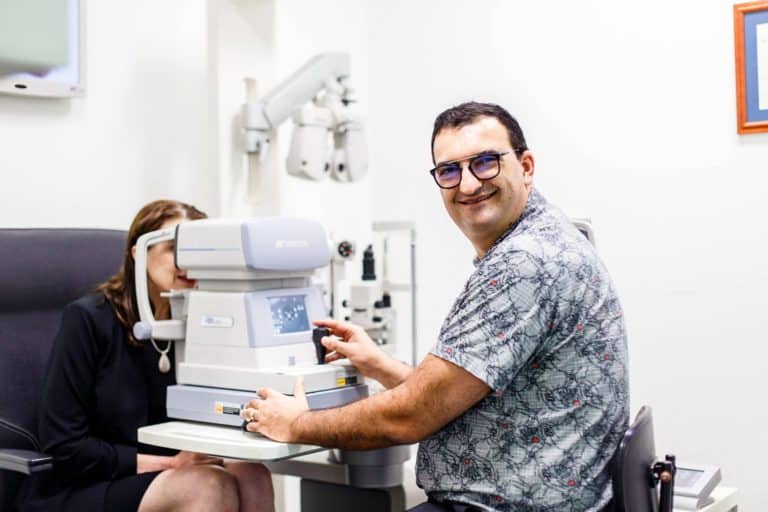When considering eye care, many individuals often wonder, “Is it necessary to have a referral to consult with a behavioural optometrist?” Understanding the nuances of this question can significantly affect your access to essential services.
You may also be interested in other questions such as “What specific signs indicate that I should visit a behavioural optometrist?”, “How can I choose the most suitable practitioner for my needs?”, and “What can I expect during my appointment?” These inquiries are vital for making informed decisions about your vision health.
Whether you are dealing with vision-related challenges or are keen to improve your visual performance, gaining a deeper understanding of how to access behavioural optometry services is crucial. Let’s delve into this topic in detail to clear up any confusion and empower you to make the best choices for your eye health.

Understanding the Referral Process for Accessing Behavioural Optometry Services
To directly address the fundamental question: In most cases, you DO NOT require a referral to book an appointment with a behavioural optometrist. Behavioural optometrists are regarded as primary eye care providers, allowing you to schedule a visit directly without needing to see another healthcare professional first, which can save you time and streamline your care process.
Nonetheless, there are particular situations where a referral might be advantageous:
Integrated care approach: If you are currently receiving treatment for related issues such as learning disabilities or neurological conditions, your current healthcare provider might refer you to a behavioural optometrist as part of a more holistic treatment plan aimed at addressing multiple facets of your health.
Complex cases: In certain instances, if you have a complicated medical history or unique eye conditions, your general optometrist or ophthalmologist may suggest a referral to a behavioural optometrist for more specialized care tailored to your specific needs.
While these scenarios do exist, they are not the norm. Most individuals can choose to see a behavioural optometrist without needing a formal referral, ensuring that access to care is straightforward and efficient.
At Eyes by Design, we welcome both direct appointments and referrals, ensuring that anyone seeking our specialized services can access the care they need without unnecessary hurdles, promoting better visual health for all.
Identifying the Key Signs That Indicate a Need for Behavioural Optometry
Recognizing the appropriate time to seek the expertise of a behavioural optometrist is crucial for effective eye care. Although referrals are generally not required, it’s important to be aware of the signs that suggest you may benefit from behavioural optometry services. Consider scheduling an appointment if you or your child are experiencing any of the following:
- Persistent reading difficulties: Struggles with reading speed, comprehension, or frequently losing your place can indicate a need for professional assistance to address underlying visual processing issues.
- Eye strain or headaches: These symptoms often arise during close-up tasks like reading or using a computer and may point to underlying problems such as convergence insufficiency or other visual dysfunctions.
- Poor sports performance: If you find it challenging to gauge distances or track moving objects, consulting a behavioural optometrist could provide valuable insights and strategies to enhance your performance.
- Attention and concentration issues: Difficulty focusing on visual tasks or becoming easily distracted may signify the need for specialized care that can address potential visual processing challenges.
- Coordination problems: Struggles with hand-eye coordination or general clumsiness can often be improved through behavioural optometry techniques designed to enhance visual-motor integration.
- Visual discomfort after screen time: Experiencing fatigue, blurred vision, or discomfort after using digital devices is a common concern that can benefit from professional evaluation and intervention.
- Learning difficulties: If a child faces academic challenges despite normal intelligence and effort, it may be beneficial to consider a behavioural optometry evaluation to rule out visual issues affecting learning.
- History of head injury or concussion: If visual symptoms persist after a head trauma, seeking expert evaluation is crucial for assessing potential lasting effects on vision.
- Diagnosed with dyslexia or ADHD: These conditions often correlate with visual processing challenges that a behavioural optometrist can effectively address through tailored interventions.
- Symptoms persist despite normal eye exams: If conventional optometry has not resolved your visual concerns, further assessment may be necessary to uncover underlying issues not identified during standard exams.
- Career-specific visual demands: Professions requiring exceptional visual skills, such as pilots, athletes, or surgeons, may necessitate a visit to a behavioural optometrist to optimize performance.
- Developmental concerns: For children lagging in visual-motor skills, early intervention can prove beneficial, helping them catch up to their peers in essential visual competencies.
It’s important to remember that you don’t need to wait for a referral to tackle these concerns. If you identify with any of these signs, feel free to directly reach out to a behavioural optometrist, such as myself, at Eyes by Design for a comprehensive eye assessment that can help clarify your visual health.
The Essential Role of Self-Advocacy in Your Eye Care Journey
While referrals are typically unnecessary for behavioural optometry, the concept of self-advocacy in eye care cannot be overstated. As a patient, you have both the right and the responsibility to seek care that effectively addresses your visual needs. Here’s why self-advocacy is crucial for achieving optimal eye health:
- Personalised care: You are the most knowledgeable about your symptoms and concerns. By proactively seeking specialized care, you ensure that your specific needs are addressed, leading to better health outcomes.
- Timely intervention: Waiting for a referral can cause unnecessary delays in treatment. Self-advocacy allows you to access the necessary care more quickly, preventing potential complications.
- Comprehensive approach: Behavioural optometrists offer a holistic perspective on vision care that goes beyond what a standard eye exam can provide, integrating various aspects of visual function.
- Empowerment: Taking charge of your eye health decisions fosters greater engagement in your healthcare journey, making you a proactive participant in your well-being.
- Awareness: By researching and selecting a behavioural optometrist, you gain a better understanding of your options for maintaining visual health and enhancing overall quality of life.
- Preventive care: It’s crucial not to wait for vision issues to escalate. Proactively visiting a behavioural optometrist can help identify problems early on, potentially saving you time and money in the long run.
At Eyes by Design, we encourage our patients to take an active role in their vision health. If you believe that behavioural optometry could be beneficial for you, don’t hesitate to reach out directly. We are here to support your journey towards optimal visual health and performance, ensuring you receive the care you deserve.

Essential Factors to Consider When Selecting Your Behavioural Optometrist
Since a referral is usually not necessary, the responsibility of selecting the right behavioural optometrist falls upon you. Here are several important factors to keep in mind when making your choice:
- Credentials: Ensure that the optometrist has received specific training and certification in behavioural optometry, which is essential for effective treatment.
- Experience: Look for a practitioner with a proven track record of successfully treating your specific concerns, as experience can greatly impact treatment outcomes.
- Technology: Choose a practice that utilizes the latest technology for assessments and treatments, guaranteeing the highest standard of care and more accurate diagnoses.
- Approach: Find an optometrist whose treatment philosophy aligns with your personal healthcare beliefs and objectives, ensuring a comfortable and effective partnership.
- Communication style: Opt for a practitioner who communicates clearly and listens attentively to your concerns, fostering a collaborative relationship.
- Location and accessibility: Assess the convenience of the practice’s location and the availability of office hours, as this can affect your ability to attend appointments.
- Patient reviews: Read testimonials or request references from current patients to evaluate the quality of care provided and the overall patient experience.
- Medicare, Health Insurance, and Costs: Be informed about which services are covered by Medicare and your health insurance, as well as any potential out-of-pocket expenses to avoid surprises.
- Specialisations: Some behavioural optometrists may focus on specific areas, such as pediatrics or sports vision, which could be relevant to your needs based on your lifestyle or specific visual challenges.
- Collaborative care: If you have other health concerns, choose an optometrist willing to collaborate with your other healthcare providers to ensure comprehensive care.
At Eyes by Design, we strive to meet all these criteria by providing expert care, advanced technology, and a patient-centered approach. We encourage prospective patients to ask questions and ensure they feel comfortable before scheduling an appointment, as this sets the foundation for a successful therapeutic relationship.
What to Anticipate During Your Initial Visit to a Behavioural Optometrist
Understanding what to expect during your first visit can help alleviate any anxiety surrounding the experience. Here’s a typical process you can anticipate at Eyes by Design:
- Comprehensive history: We’ll discuss your visual concerns, overall health, and lifestyle factors that may influence your vision, allowing us to tailor our approach to your unique situation.
- Standard eye exam: This includes tests for visual acuity, refraction assessments, and evaluations of eye health, forming the basis of your comprehensive care.
- Specialised testing: We’ll assess various aspects of visual function, including eye teaming, tracking, and focusing abilities, which are crucial for effective vision.
- Functional vision evaluation: This may involve tests designed to replicate real-world visual tasks, helping us understand how you use your vision in daily life.
- Visual processing assessment: We’ll evaluate how your brain interprets visual information, which is essential for effective vision and overall functioning.
- Discussion of findings: We’ll explain our observations and how they relate to your specific symptoms or concerns, ensuring transparency in your care.
- Treatment recommendations: Based on our findings, we’ll propose a personalized treatment plan tailored to your needs, which may include various interventions.
- Questions and answers: We encourage you to ask questions and express any concerns regarding our findings or recommendations, fostering an open dialogue.
- Next steps: We’ll outline the proposed treatment process and schedule follow-up appointments if needed, ensuring you know what to expect moving forward.
Remember, this process is not solely about assessing your eye health; it’s also about enhancing your overall visual performance and quality of life. Come prepared with questions and be ready to engage actively in your care, as your involvement is key to achieving the best outcomes.
The Crucial Impact of Behavioural Optometry on Your Overall Health
Behavioural optometry plays a crucial role in contributing to your overall health and well-being in various ways:
- Cognitive function: Clear vision is vital for effective learning and information processing, impacting academic and professional success.
- Physical health: Vision problems can lead to poor posture and physical strain, negatively impacting overall health and increasing the risk of injury.
- Mental health: Difficulties with vision can cause increased anxiety and lower self-esteem, affecting overall emotional well-being.
- Productivity: Optimal visual function is essential for both work and academic success, influencing job performance and career advancement.
- Quality of life: Achieving clear, comfortable vision enriches daily activities and interactions, enhancing your enjoyment of life.
- Safety: Good vision and effective visual processing are critical for safe activities, such as driving, which is essential for independence.
- Social interaction: Visual cues are important for non-verbal communication, affecting relationships and social engagement.
- Preventive care: Early intervention can help avert the progression of vision issues, safeguarding your long-term health and reducing the likelihood of serious problems.
By thoroughly addressing visual function, behavioural optometrists significantly contribute to overall health and well-being. This holistic approach underscores the importance of seeking specialized care whenever necessary, regardless of whether a referral is involved, to promote comprehensive health.
Effective Strategies for Accessing Behavioural Optometry Services
While a referral is generally not required to see a behavioural optometrist, understanding when and how to access this specialized care is essential for timely intervention. At Eyes by Design, we are committed to offering accessible, comprehensive vision care that goes beyond standard eye exams.
Whether you are dealing with specific visual challenges or simply wish to enhance your visual performance, don’t let the lack of a referral prevent you from seeking assistance. Take charge of your visual health by contacting a qualified behavioural optometrist directly, ensuring you receive the support you need.
Remember, your vision impacts every aspect of your life. By choosing behavioural optometry, you are making a valuable investment in your overall well-being and quality of life, paving the way for a brighter future.
We urge you to listen to your body, recognize the signs indicating that you may require specialized care, and take proactive steps towards achieving optimal visual health. Your eyes deserve the best attention and care.
If you have any questions or would like to schedule a routine eye exam, please don’t hesitate to reach out to us at Eyes by Design. Your journey to improved vision and enhanced well-being starts here.
This article aims to enhance understanding and knowledge about general eye health topics.
It should not replace professional advice, diagnosis, or treatment.
Always consult your healthcare professional before incorporating this information into your health regimen.
Dr Nicholas Altuneg
For over two decades, my greatest passion has been helping people of all ages live improved lives through better vision. At Eyes by Design, vision is much more than simply seeing clearly or reading small letters from a distance; it fundamentally shapes your perceptions and reactions every moment of your day.
Read more about Dr Nick
Do You Need a Referral to See a Behavioural Optometrist? Everything You Need to Know
The Article: Referral to See a Behavioural Optometrist: Key Insights first appeared on https://writebuff.com.
The Article Behavioural Optometrist Referral: Essential Insights Was Found On https://limitsofstrategy.com


I really appreciate this exploration of the necessity of referrals for consulting a behavioural optometrist. It’s a topic that doesn’t often get the attention it deserves, and the nuances you’ve touched upon make it even more compelling.
It’s interesting to see the emphasis on understanding the referral process for accessing behavioural optometry services. In my experience, the requirement for a referral can vary significantly depending on healthcare systems and insurance policies in different regions. In some places, getting a referral can feel like an unnecessary hurdle, especially if you’re already aware of specific issues needing attention, such as visual processing difficulties or learning challenges.